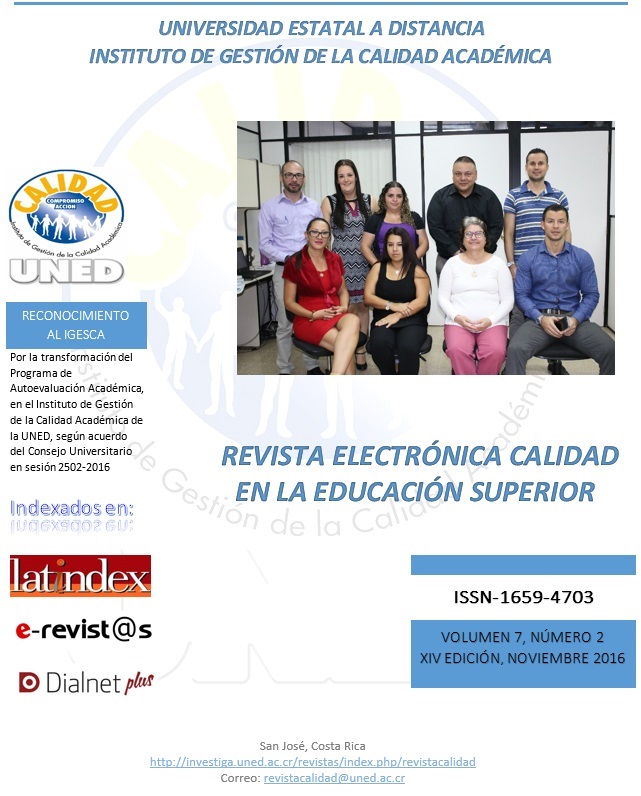EXPERIENCE OF IMPROVEMENT FROM THE PRINCIPLES OF EDUCATIONAL PRACTICES OF DISTANCE EDUCATION IN THE COURSE INTRODUCTION TO COMPUTING CODE 00210, UNED, COSTA RICA
DOI:
https://doi.org/10.22458/caes.v7i2.1597Abstract
Experience is analyzed at the UNED - Costa Rica in the class named Introduction to Computing, code 00210, as a proposal to develop academic and informational skills. The problem is approached from improving academic practices and reinforcing the principles of distance education of self-regulation, self-awareness and independent learning. Also it conceptualizes the stage and the role of executive functions in distance education model of the UNED. Reports the results of the intervention to strengthen social inclusion, informational and academic skills of students. It is also concluded that the intervention process reinforces the distance learning model.
References
Carr, W. (1996). Una teoría para la educación: hacia una investigación educativa crítica (3a ed.). Madrid: Morata España.
Castells, M. (1996) La era de la información. Economía, sociedad y cultura. Madrid, España: Alianza. V.1
Castells, M. (2003). La galaxia Internet. Barcelona: Debolsillo.
Castro, D; Sánchez, A; (2013). Cerrando la brecha entre nativos e inmigrantes digitales a través de las competencias informáticas e informacionales. Apertura, 5(2) 6-15. Recuperado de http://www.redalyc.org/articulo.oa?id=68830444002
Chacón, X. & Ramírez, J. (2014). Propuesta metodológica, apoyada en tic, para el curso 210 introducción a la computación de la Universidad Estatal a Distancia dirigida a estudiantes privados de libertad. San José: UNED. Maestría en Tecnología Educativa.
Díaz, A. y Pérez, M. (2013). Autoeficacia, enfoque de aprendizaje profundo y estrategias de aprendizaje. International Journal of Developmental and Educational Psychology INFAD. Revista de Psicología,1(2), 341-346.
García, L. (2001). La educación a distancia: de la teoría a la práctica. Barcelona: Ariel Educación.
Garrison, R. (2009) Implications of Online Learning for the Conceptual Development and Practice of Distance Education, Journal of Distance Education, 23(2), 93 - 103.
Herrera, M. & Herrera, J. (2012) ¿En qué consiste una práctica educativa? Actualidad. Pedagógica, 59, 265-268.
Jovellanos, L. (2006). Cibersociedad: los retos sociales ante el nuevo mundo digital. México, D.F.: Mc Graw-Hill.
Martínez, E., Harb, S. & Torres, M. (2006). Funciones ejecutivas en estudiantes universitarios que presentan bajo y alto rendimiento académico. Psicología. Desde El Caribe, (18), 109-138.
Taylor, J. (2001). Fifth Generation Distance Education Higth Educaction Report (40). Recuperado de http://www.c3l.uni-oldenburg.de/cde/ media/readings/taylor01.pdf
UNED, Consejo Universitario. (2004). Modelo Pedagógico. San José: UNED.
UNED, Consejo Universitario. (2012). Reglamento General Estudiantil. San José: UNED.
Downloads
Published
How to Cite
Issue
Section
License
Esta revista provee acceso libre inmediato a su contenido bajo el principio de que hacer disponible gratuitamente la investigación al publico, lo cual fomenta un mayor intercambio de conocimiento global.
